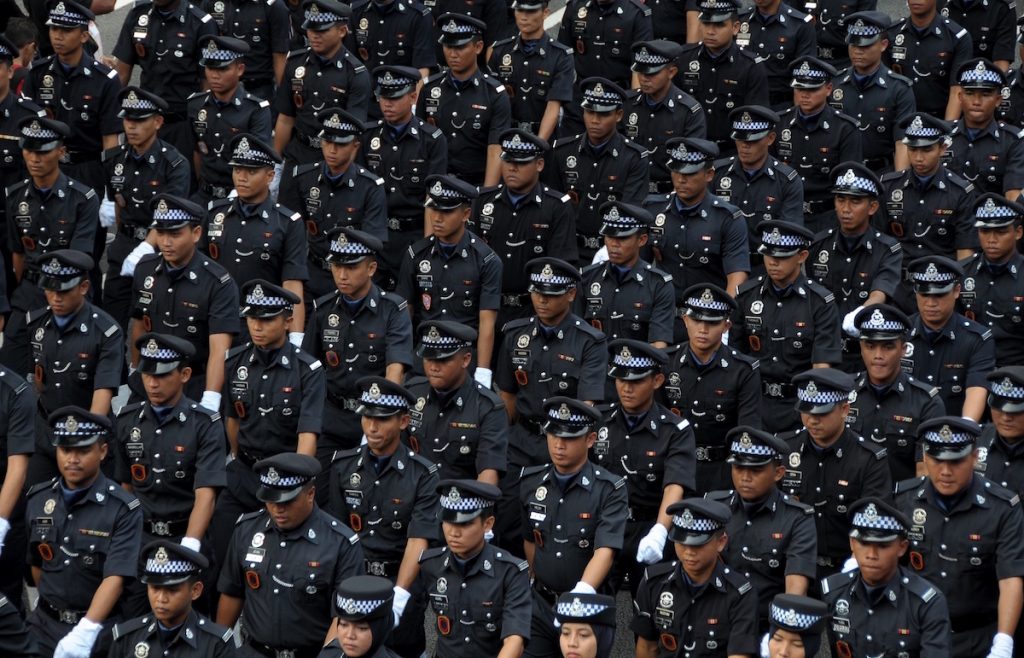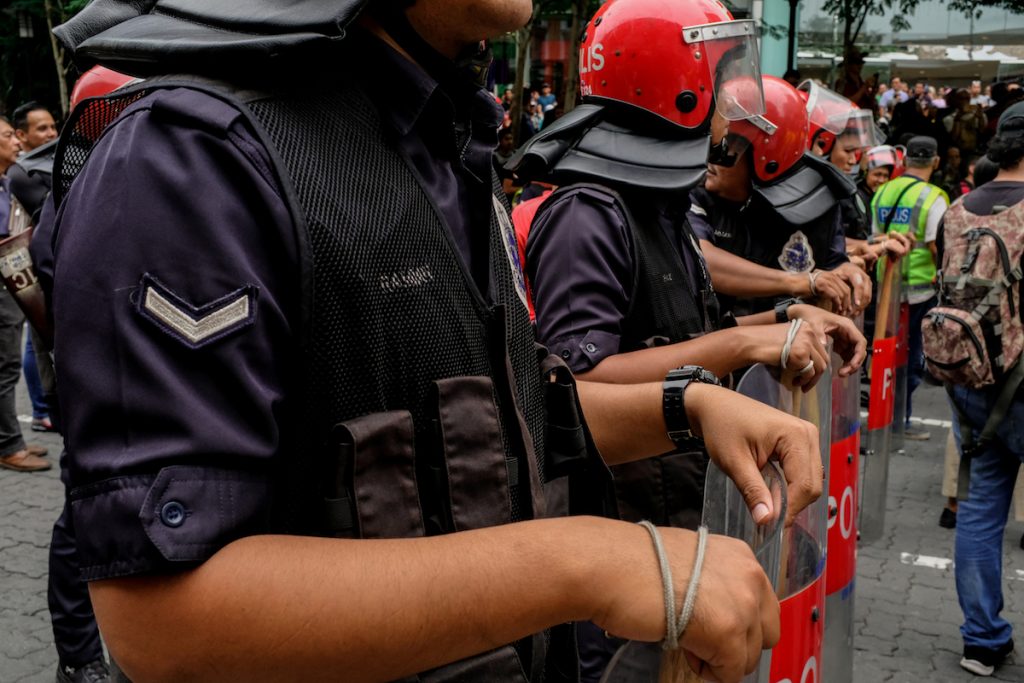As Malaysia entered a new year — and tries to leave 2020 well in the past — Inspector-General of Police (IGP) Abdul Hamid Bador gave an unusually frank interview to a national newspaper, in which he laid bare the problems of corruption within the police force and indeed the threat to his own job.
While Hamid is known for his forthright approach, he has always remained tight lipped about issues that may jeopardise the force’s integrity, a word that forms part of the uniformed branch’s motto and one to which he holds dear.
Yet, the police have had to weather some seriously embarrassing scandals over the past few months, which have highlighted the problems of endemic corruption within their ranks and all but destroyed any faith the public have in their ability to perform their duties.
The Royal Malaysia Police have always endured a chequered relationship with the public. Woefully underpaid, rank-and-file officers became notorious for extracting ‘duit kopi’ (literally, coffee money) from motorists at roadblocks or through random stops for offences committed or perceived.
Similarly, traders often grumbled of having to cough up bribes to encourage the police to look the other way while they went about their daily business.
Meanwhile, the continued racist ‘bumiputera’ policy of affirmative action for ethnic majority Malays, cemented in providing jobs for them in the civil service, has also led to a deep-seated hatred of the force among the Chinese and Indian minorities, who constantly complain of harassment and unfair treatment.
As such, Malays make up roughly 75-80 percent of the headcount in the police (lack of transparency and independent analysis make it difficult to give accurate figures), with Indians accounting for 4 percent and Chinese just 2 percent.

The disparity is readily apparent when comparing the figures with the general population: 60 percent Malay, 25 percent Chinese, 10 percent Indian.
Relations between the police and the public slumped to the lowest point in decades, in the final years of the Najib Razak administration.
Then IGP Abdul Khalid Bakar, already established as Najib’s loyal pit bull, infamously patrolled social media to round up dissenters and have them report to federal police headquarters to face sedition charges.
Paramilitary police units also made regular headlines, raiding establishments owned by organised crime gangs. Again, it was noted that almost of the raids targeted Indian and Chinese gangs, leaving Malays largely untouched.
There was a glimmer of hope during the brief liberal government that held power for two years from May 2018. Rank-and-file officers broke their silence and — in an open letter to Hamid, who had just been appointed IGP — demanded he root out corruption within the force.
They quite rightly had cause for hope. In 2015, Hamid was the first senior police officer to speak up and call for a thorough investigation into the 1Malaysia Development Berhad (1MDB) scandal, for which Najib was later convicted of corruption, and the former PM promptly had him removed from his position.
Hamid was later persuaded to re-join the force by Najib’s successor.
Yet, despite initial optimism, Hamid’s time at the helm of the police force has been far from rosy.
While he may hold integrity dear to his heart, he had a significant hand in killing off any notion of civilian oversight of the police and thus greater transparency.
Regardless of his ideals, this move fomented public mistrust of the force, who saw his unwillingness to shed light on indiscipline within the ranks in particular as a sign that something ominous was afoot behind closed doors in headquarters at Bukit Aman.
Enter the Malaysian Anti-Corruption Commission (MACC), which has new-found freedom and caused Hamid his greatest headaches of recent months.
The anti-graft agency has traditionally worked in tandem with the police, but until 2018 was largely seen as an impotent unit only good for catching the little fish.
By-and-large, the media only ever reported MACC prosecutions of cases valued at no more than US$ 250, which were almost always low-level civil servants caught taking a one-off bribe.
On the rare occasions any big fish were brought before the courts, it was because they had likely fallen foul of the sitting prime minister.
However, upon the collapse of the Najib administration in 2018, the gloves came off. Indeed, he became the titular ‘Billion Dollar Whale’.

The MACC went on to make numerous high-profile arrests of Najib cronies and family, as the nation sought recompense for widespread looting of government coffers.
Still now, despite a change back to a more conservative government, the MACC still operates under a much wider remit.
Late last year, it concluded a massive sting operation, in which dozens of mid and senior police officers were detained on suspicion of their involvement in a major illegal gambling racket.
Far from the traditional role of taking money to look the other way, these officers were accused of participating in the gang, including acting as enforcement and protection.
This was followed a few weeks later by another swoop on police officers, this time for running a visa forgery ring, allowing companies and criminal gangs to falsify visas for migrant workers, thus keeping them in Malaysia when they should have otherwise been sent home.
Aside from the demonstrable capability of the MACC to plan and carry out long-term infiltration and surveillance operations — and against its supposed ally, of all institutions — the incidents exposed the problem that endemic corruption had pervaded almost all levels the police.
While Hamid scrambled to deal with two major body blows to his beloved force, he was to have a far from festive Christmas and New Year period.
A massive import scam was uncovered in the southern port city of Johor Baru, where it was discovered a variety of port authority and law enforcement officials had, for many years, been bribed to pass meat coming into the country as halal, regardless of religious status or even quality.
This prompted disquiet among domestic consumers and has proven to be an international embarrassment for Malaysia, which lauds its halal food export industry around the world.
For Hamid, it seems to be the straw that broke the camel’s back for, in the recent interview with the newspaper, he confessed that a ring of dirty mid and senior cops was gunning for him, and he feared for the future of the police once he retired.
Such a stark statement highlights once again the problems Malaysia faces, if its most senior police officer holds up his hands in apparent submission to the demon of corruption.
Yet, like so many social ills facing the nation, there has been no response from government. Of course, ministers promise “stern action” against the officers involved in the scandals, but this is the standard automated acknowledgement, as if it were an email autoreply.
In Malaysia, where politicians are consumed by politicking, governance is a long-lost art.
So, it is likely that Hamid’s gesture of exasperation is to be one of his last before he throws in the towel or he is replaced with a yes-man who can smile and whitewash over the cracks.
And that ring of dirty cops can go back to raking in their ill-gotten gains at the people’s expense.
Gareth Corsi is a freelance journalist based in Malaysia. The views expressed in this article are the opinions of the author and do not necessarily reflect the editorial stance of LiCAS.news.






